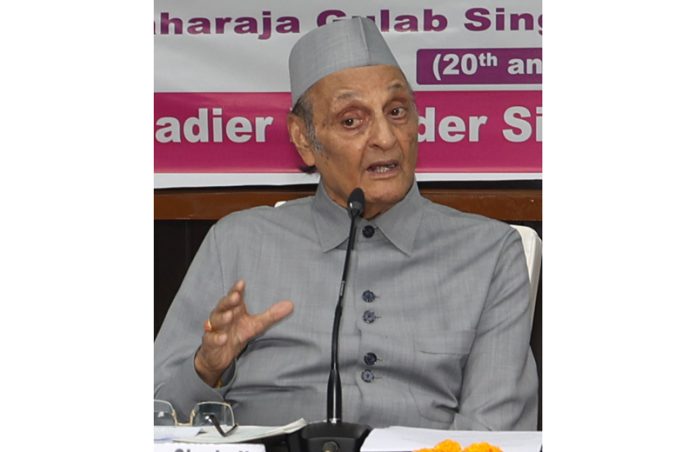‘Continuous rule of any party not good for democracy’
Nishikant Khajuria
JAMMU, Oct 20: Strongly vouching for Assembly elections in Jammu and Kashmir Union Territory, veteran Congress leader and former Sadar-e-Riyasat, Dr Karan Singh has said that issue of J&K would not be considered solved till a popular Government is installed.
“Till elections are held and a popular Government is formed here, I don’t believe that the issue of Jammu and Kashmir has been settled,” he said in response to a query by media persons on sidelines of a national seminar on General Zorawar Singh at Jammu University, here today.
While elaborating, Dr Karan Singh said that in absence of MLAs, a connect between the administration and public was missing and the same would resurface only through an elected Government for which elections must be held. “Though administration is doing well, but its connect with public is missing,” he hastened to add.
In a veiled campaign, Dr Karan Singh opined that prolonged continuous rule of any particular party was not a healthy sign of democracy and if INDIA – the alliance of opposition parties, fields common candidates and do something, it would be good for the country.
“I cannot predict whether they (opposition) succeed or not, but strong opposition is good for democracy in the country,” he said.
Pertinent to mention that Dr Karan Singh has been included in the newly formed executive body of Jammu Kashmir Pradesh Congress Committee (JKPCC), which was announced yesterday by AICC.
Earlier, while addressing as chief guest in the seminar, scion of the erstwhile royal Dogra family, Dr Karan Singh alleged that successive Governments at the Centre didn’t want him to be involved in any process for solution of Jammu and Kashmir only because he knew too much about the issue and its historic background.
“Though I achieved a lot in 74 years of my public life, but I have never been able to make a contribution towards working out a solution of J&K because successive Governments of India did not want me to be directly involved in J&K fearing that I might speak the truth related to the issue,” he said.
“May I have spoken the whole truth, it could have been embarrassing for the Government of India and of course nobody wants to get embarrassed,” he added.
Dr Karan Singh lamented that people were interested in accession only as they did not look at the history of Dogra rulers and their contribution in making Kashmir, its horticulture, sericulture, health and education facilities, tourism etc.
“They only say that Maharaja Gulab Singh bought Kashmir in Rs 75 lakhs and Maharaja Hari Singh did accession with India. They don’t look at what these people (Dogra rulers) did for the country. You can’t brush Dogras aside,” he said and regretted that Maharaja Gulab Singh’s place in creation of modern India was not adequately recognized.
“It has not been recognized clearly that had Maharaja Gulab Singh not founded the State of J&K, India’s border would have not been beyond Patnitop, not even Banihal perhaps,” he said and stressed that whole northern part of the country is part of India as a result of the State founded by the first Dogra ruler.
Reiterating that Maharaja Gulab Singh never got his due as political strategist and visionary while General Zorawar Singh also never got his due as greatest warrior ever produced in India, Dr Karan Singh said that he did not want to denigrate others but only asserting the truth.
“Everybody talks about Chhatrapati Shivaji Maharaj, Maharana Pratap and others. Though we have great respect for these heroes, they all fought within the boundaries of India and where they were located. It was Dogras alone who were able to extend boundaries of India all the way up to Central Asia and Tibet,” he explained and said it was something which he could not understand why our historians ignored.
Alleging that there has been a constant attempt to denigrate and brittle Dogras in Indian history, Dr Karan Singh called upon researchers to bring truth before all and let others know about critical role played by the Dogra warriors in shaping history of northern India and modern India.


